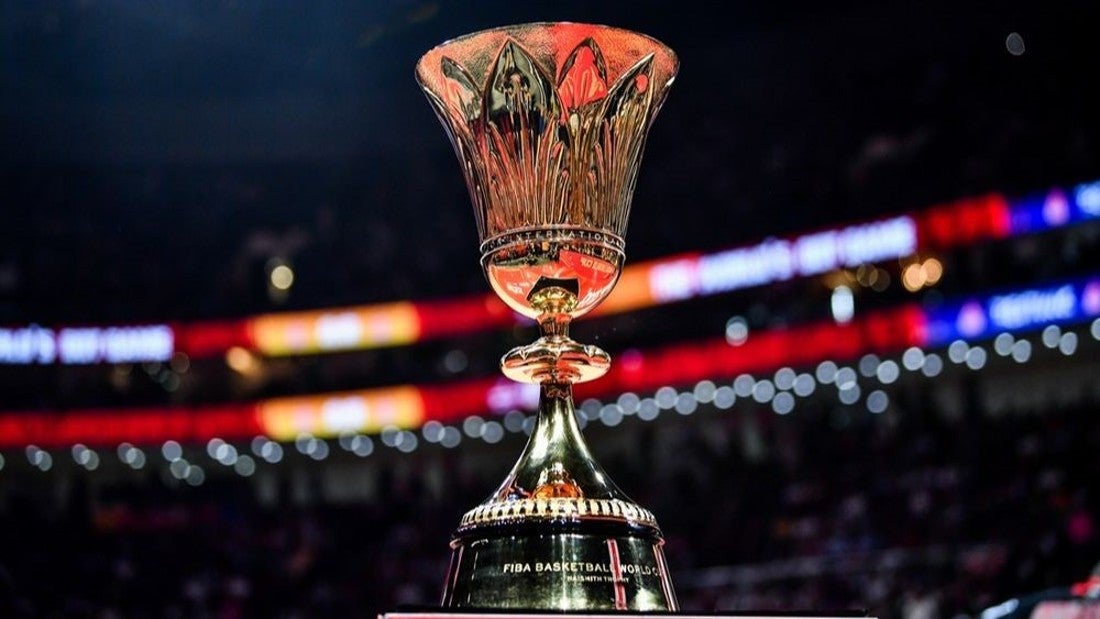
The upcoming FIBA World Cup will be the “most successful” commercially and allow basketball’s international governing body to break even for the four-year cycle and continue recovering from the financial impact of the global Covid-19 pandemic, secretary general Andreas Zagklis has said.
The governing body has signed up a record number of partners for the tournament and sold out its 10 global sponsorship packages for the first time ahead of its flagship event, which will be held in Japan, Indonesia, and the Philippines.
The top-tier global partners are: Nike, TCL, Tencent, Tissot, Ganten, Wanda, J9, Molten, Smart Communications, and Yili, which came on board in April.
Those deals were brokered by FIBA Marketing, the strategic partnership between FIBA and the Infront agency.
Global partnerships encompass all FIBA national team competitions across the four-year cycle.
The World Cup, which begins on August 25, will also have 24 local event sponsors across the three host countries, which FIBA has said will make it the most successful commercially.

US Tariffs are shifting - will you react or anticipate?
Don’t let policy changes catch you off guard. Stay proactive with real-time data and expert analysis.
By GlobalDataSpeaking to international media yesterday, Zagklis said: “In sheer numbers, this is a record World Cup in terms of partners. In commercial terms, it is the most successful World Cup we've ever had already.
“The interest we have received from top-level brands in all these three markets as well as from our global partners around the world is certainly very important.”
In 2019, FIBA generated revenue of CHF152.4 million ($174.5 million) when it last held the Basketball World Cup in China, its first in Asia.
The Covid-19 pandemic has had a major impact on the federation’s finances since then, as it made an overall net loss of CHF13.5 million for 2020 (in which the pandemic broke out globally) and revenues of only CHF65 million. Russia’s invasion of Ukraine early last year has also impacted FIBA’s books.
Zagklis said: “We are going into the FIBA Congress next week closing a four-year period with Covid and a war in Europe that had global effects, and we are presenting to our members almost break even [financial results] for four years.
“Our Continentals last year and World Cup this year have given us the opportunity to recover from the ‘annus horribilis’ that was 2020 for all international sports federations.
“Next year, we will be in a position to say how we scored in terms of exact numbers from the 2023 World Cup, but it is undeniable that the number of sponsors in this World Cup leads us to the conclusion that commercially this will be the most successful year.”
In the trio of host countries, the local organizing committees have each secured event sponsors that will have rights to market in those territories.
The local partners are:
- Philippines: San Miguel (beer), Toyota (car), Unilab/Alaxan (pharmaceuticals), Cignal (pay-TV partner), BDO (bank), Dunkin (quick service restaurant coffee and sweets), Arena Plus (sportsbook), Gatorade (sports drink), Jollibee (quick service restaurant), and Rexona (deodorant).
- Japan: Nippon Life (insurance), SoftBank (technology), Orion (beer), Tokio Inkarami (cosmetics), Oriental Bio (health food), Gakkyusya (education), Timee (recruitment), and PCA (software).
- Indonesia: Mandiri (banking), Pertamina (oil and gas), PLN (electric power), Gojek (online transportation and logistics), Bukit Asam (energy mining), and Kahf (men’s grooming).
Reach
The 2019 World Cup achieved record-breaking results in terms of exposure, with a TV audience reach of over 3 billion, and generated a further 1.5 billion video views on social media – securing “more global coverage than ever before.”
FIBA partnered with over 70 broadcast partners to deliver coverage in 190 territories, resulting in a total cumulative average TV audience increase of over 80% compared to the last World Cup in 2014.
Zagklis is confident these numbers will be surpassed this year with favorable time zones and matches scheduled for prime-time slots across the three hosts.
He said: “The 2023 qualifiers, the prelude to the World Cup, by far exceeded the popularity of the qualifiers before China 2019 and the fact that we are in three similar but different time zones also plays in our favor of better distributing the broadcasting of the games.
“Not all games will start at the same time and in terms of the span of the day, we can access longer primetime slots for the audiences. Certainly, our volume will grow. Therefore, we do expect this to surpass the reach of 2019.”
Last week, North American basketball’s NBA agreed a deal with FIBA to carry the governing body’s Courtside 1891 digital platform and provide coverage of the World Cup.
Through the tie-up, the NBA App and NBA.com will carry FIBA’s digital platform and show the tournament in 20 countries and territories.
The markets included are Angola, Argentina, Cape Verde, Ivory Coast, the Czech Republic, the Dominican Republic, Greece, Indonesia, Israel, Latvia, Lithuania, Mexico, Poland, Puerto Rico, Serbia, Slovenia, Spain, Thailand, Turkey, and the United Kingdom.
Zagklis additionally confirmed that Courtside 1891 will provide live coverage of the World Cup in markets where media rights deals have not been struck.
The FIBA secretary general said: “The partnership with the NBA has many levels and there has been collaboration on the media side for many years.
“Now that we both have two direct-to-consumer offerings that are very high quality, it made absolute sense to combine them. There’s interest, not only in the USA team which has an excellent roster but also in the number of NBA players participating in the World Cup.
“The interest in what the international players are doing is so big that also in the United States, it made absolute sense and we're very happy about this collaboration.
“The NBA is very supportive of the World Cup and is represented on the FIBA board and on the executive committee. This level of cross-promotion is a very important step, and we expect to see good results from the users of the NBA app.”



